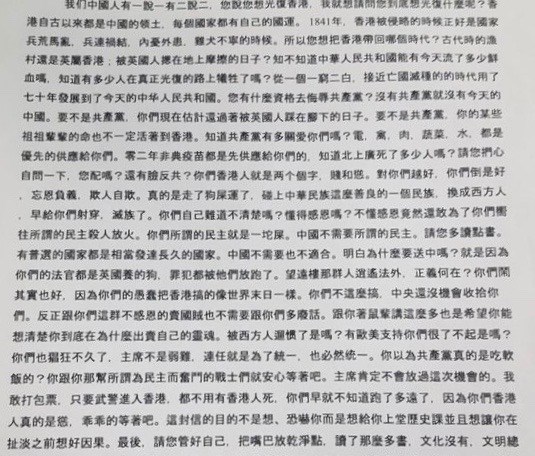It would be nice to think that schools are a safe zone, a place where world conflicts are kept at bay and students are free to pursue knowledge free from bias and indoctrination.
But that’s not the case, nor has it ever been.
Schools inevitably reflect the societies in which they exist — and vice versa. The idea of knowledge for knowledge sake has always been a misnomer. What we study, how we study it, and even who studies is inevitably subject to a larger context in which biases, beliefs and ideologies are all factors.
I’m on about this following the latest case in which global politics played itself out in a Richmond school hallway.
Last week, a student, who had displayed a pro-Hong Kong slogan, found a letter pasted on the door of his locker. The full page letter written in Chinese said it intended to teach him a “history lesson.” It asked the student why he would “humiliate the communist party....Do you know how many Chinese people have sacrificed their lives for establishing the People’s Republic of China?” The letter also called the Hong Kong protestors “despicable and cowardly.” (For a translation of the complete letter, go to Richmond-News.com.)
A picture of the letter was posted to social media where (surprise, surprise) it took on a life of its own.
This incident falls hot on the heels of another in which a Richmond teacher showed a clip from a pro-China propaganda film to a Mandarin language class. Again, a student told their parent who posted it on social media, and off it went.
In both cases, we at the Richmond News contacted the school administration as well as trustees. In both cases, we were told staff is dealing with the families involved and no one would provide an interview. We were directed to the school district website that outlines its Code of Conduct as well as its protocol regarding course material.
I appreciate that schools have their hands full, but I question this attempt to keep the story in-house.
In this recent case, we were told by two independent sources that the individuals involved were specifically told not to go to the media. The catch, of course, is they already had. Love it or hate it, there are no secrets in a world where Twitter, Facebook, WeChat, et al, hold sway. And once it’s flying around those channels, legacy media (as they’ve taken to calling us) has a duty to at least consider it.
Given our new reality, perhaps there’s an opportunity. I would love to see an open conversation that involves the community at large about how schools deal with media, propaganda and colliding political views.
If there is one thing that a democracy requires of its public education it is the teaching of critical thinking. We can’t protect students from propaganda and political conflict, but we can arm them with the skills to debate and question assumptions. I know we have some great teachers doing just that, but, as we’ve seen, this goes beyond the classroom — and so it should.
We all have a stake in public education, which is why we all — media and elected leaders included — need to be part of a robust conversation surrounding these points of contention.



